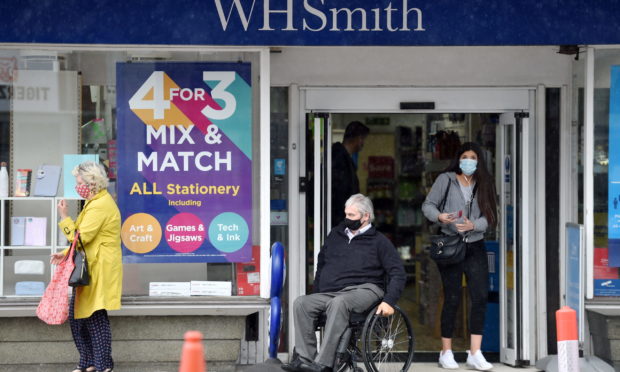Business organisations across Scotland have led urgent calls for an extension to the furlough scheme and targeted support for hard-hit sectors, warning the “very survival” of shops, restaurants and businesses is at stake.
Calls have ramped up for further government support measures to protect jobs and firms amid warnings of a “crushing blow” to business from the latest coronavirus restrictions.
Prime Minister Boris Johnson warned new measures, including a 10pm curfew on pubs and restaurants, could last six months, but failed to confirm any extension to the furlough scheme.
In Scotland, First Minister Nicola Sturgeon announced more stringent Covid-19 restrictions, including a ban on household visits.
Russell Borthwick, chief executive of Aberdeen and Grampian Chamber of Commerce, criticised both governments for “unhelpfully” indicating the new restrictions could potentially be in place for a sustained period despite the “fast-changing nature of the situation”, claiming this is “further damaging consumer confidence and demand”.
The business organisation chief said the continued emphasis on working from home “puts at risk the very survival” of retail businesses, restaurants and wider businesses in towns and cities that rely on the footfall from office workers.
He added that further delays to reintroducing live events could spell the “death knell for many venues” and claimed the guidance to avoid travel is putting “incredible strain” on the aviation sector, in particular.
Mr Borthwick said: “All of this reinforces the importance of the Chamber’s persistent ask for targeted and meaningful support for these sectors.
“The Scottish and UK governments need to come together to set out clear review points and a route map out of these additional restrictions, but more crucially, a comprehensive package of support for the many businesses that continue to face tight limits on their operations.
“An evolution and extension of the furlough scheme, further targeted grant support and measures to reduce the cost of employment all need to be delivered now to protect jobs as these stricter rules come into force.”
Alison Henderson, CEO of Dundee and Angus Chamber of Commerce, said the restrictions on the hospitality sector have made it “very difficult” for businesses to stay afloat, especially now they will operate under reduced hours.
The winter months will also bring additional challenges, the organisation’s chief said, when sitting outside “just isn’t appealing”.
She added: “We have seen a number of businesses just not sure if they can make these restrictions pay.
“We want people to be safe and consumers to feel they can come out and spend their money locally.”
In terms of practical support, Ms Henderson wants to see an extension to the furlough scheme to support those sectors who will continue to be badly-hit but would also like to see additional support from government to alleviate business costs.
The Scottish and UK governments must work together to do everything they can to protect viable firms and jobs in the coming weeks and months.”
Tracy Black
The chief executive also said the continued differences between the approaches of the UK and Scottish governments is making it challenging for businesses to navigate the guidance.
Tracy Black, CBI Scotland director, said earlier closing times for Scotland’s pubs, cafes and restaurants would be a “bitter pill” for a sector already “hugely impacted” by the crisis.
The business leader said the prospect of prolonged remote working will “undoubtedly” be a cost to city centre economies.
She added: “There must now be a new plan to support businesses this autumn. This should start with a successor to the Job Retention Scheme and allowing cash-strapped businesses to defer their VAT payments from the last quarter – a no-brainer given this latest blow to our economy.
“The Scottish and UK governments must work together to do everything they can to protect viable firms and jobs in the coming weeks and months.”
Andrew McRae, the Federation of Small Businesses’ (FSB) Scotland policy chair, believes new financial support must be provided for those businesses “hardest hit” in the pandemic, in order to avoid the new restrictions becoming the “final straw for many independent firms”.
He said: “Disappointingly, what we didn’t hear at Holyrood or Westminster were details of new help for firms forced to reduce hours or shut up shop.
“Many smaller businesses are close to exhausting their cash reserves, while others have taken on debt to adapt their operations to try to keep trading.”
However, the Scottish Trades Union Congress (STUC) said working from home is “absolutely the right approach”, with the virus on the rise across the country.
STUC General Secretary Roz Foyer said: “We welcome the First Minister’s recognition that financial support is needed for workers who are asked to self-isolate and we look forward to seeing the detail of this scheme.
“However, while Boris Johnson finally seems to be realising the need for clear public health messaging, we cannot ask individuals to make ongoing sacrifices without providing practical support in return.
If we are to avoid another lost generation falling through the cracks, we need to see an extension of the furlough scheme and financial support for workers now.”
Roz Foyer, STUC General Secretary
“The Prime Minister says the UK Government will put its arms around the workforce, but the reality is that workers are being laid off in the thousands as the furlough scheme is wound down.
“There is now a growing chasm between public health restrictions and financial support for workers.
“If we are to avoid another lost generation falling through the cracks, we need to see an extension of the furlough scheme and financial support for workers now.”
Speaking in the House of Commons on Tuesday, Prime Minister Boris Johnson said there will be “further demands” for support from specific sectors. He added: “But the best thing for them is to get back to life as close to normal as possible by getting this virus down and that is the point of the package of measures that we are announcing today.”





